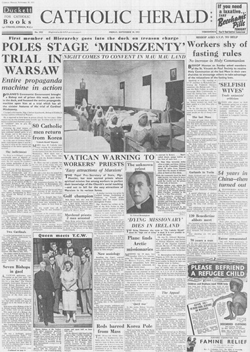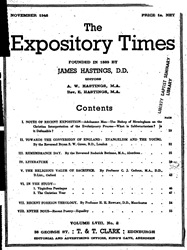In the 1950s, Joan Newton was the radio and television reviewer for the
Catholic Herald. Through the magic of the paper's
online archive, it's possible to trace Ms. Newton's love affair with Henry Reed's Hilda Tablet plays on the BBC's Third Programme, starting with
A Very Great Man Indeed in 1953:

Somebody's guardian angel—mine, I suppose—suggested to me to listen to Henry Reed's "A Very Great Man Indeed," produced by Douglas Cleverdon on the Third. Just before, the Vienna Philharmonic Orchestra from Edinburgh had been coming through very badly and I was prepared to have to turn off the play as well. I'm glad I didn't.
It was about "the late Richard Shewin, 'the poets' novelist,'" and his biographer, Herbert Reeve (Hugh Burden), was visiting the great man's relations and friends to get an idea of his character.
"Dear me, I've never heard of Richard Shewin," I was thinking as I listened to the beginning. But when the earnest biographer got upstairs to see the permanently bedded brother of the late R.S., and after meeting with the sister-in-law and her cats, I realised that either it was meant to be funny or something had gone wrong somewhere. And funnier and funnier it grew, and more and more enjoyable.
I find it hard to decide which incident I enjoyed most—Mary O'Farrell as the composeress, Norman Shelley being a contemporary novelist, Harry Hutchinson as the Irish poet, or the glorious ending with the late novelist's nephews singing "Don't Hurt My Heart," a very tearful lyric in the Frankie Laine manner. Repeat, please.
This loss in a few days of almost all the family's chief stand-bys for lighter listening [
Take it from Here, Life with the Lyons, Talk about Jones, and
Have a Go] was made bearable only by the further repeat of the Third Programme's "A Very Great Man Indeed," written by Henry Reed and produced by Douglas Cleverdon. I had heard this twice before, but laughed as much as ever.
The only jarring note for me was the Graham Greeneish episode about the worried priest at the end, which was an accurate pardoy in style only and not in content, and had too much the air of mischievous afterthought to make an artistic conclusion.
I wonder if the author and producer—and perhaps more especially, the composer, Donald Swann—will be able to repeat their success in "
The Private Life of Hilda Tablet," promised us for May 24 and 26. Those who did not hear "A Very Great Man" may like to know that Hilda is a modern composer. They ought to be warned, too, that the play is unlikely to be wholly suitable for children.
Perhaps it was rather much to expect that Henry Reed should hit the bell so definitely with his "Private Life of Hilda Tablet" (Third Programme) as he did with "A Very Great Man Indeed." All the same, it was a splendid entertainment and one still clamours for more of the same kind.
The defects in this second show—they are defects in comparison only—seemed to me to be that the characters had become more familiarly "types" than they were before, that the satire was slightly less sharp, and that some episodes, such as the "drunk" scene at Hilda's school, were rather too drawn out.
Mary O'Farrell as Hilda, the modern composeress, was as hearty and vigorous as ever but not quite as real as before—less Waugh and more Wodehouse. Herbert Reeve, the scholar through whose reminiscences we become acquainted with all these odd people, was still a deliciously wide-eyed and dedicated Boswell; but in the earlier show his approach was more "dead-pan," more Third Programme, and consequently he came out more amusingly in contrast with the astonishing goings-on in which he gets himself involved.
I hope we shall have more of one gorgeous new character, Deryck Guyler as the Rector of Mull Extrinseca.
Donald Swann's clever musical parodies, which naturally had more scope this time, lived up to all expectations. And that brings me on to the unhappy case of Marjorie Westbury, who was so impressive as Elsa Strauss, Hilda's long-suffering singer—'Throw yourself at the note if you like, but for heaven's sake don't hit it!'—that I am now quite unable to think of her as anything else.
This week they [
Said the Cat to the Dog] were assisted by "Mrs. Kerry," a cow, but she is, perhaps, a bit too much of a chatterbox and just a weeny bit too "Oirish" for our liking. I mention her specially because she is played by another of those versatile radio actresses, Mary O'Farrell. It's a far cry from her acting a cow to being the energetic Hilda Tablet in the latest of Henry Reed's witty Third Programme diversions, "
Emily Butter."
I was looking forward to hearing Hilda's much-publicised opera. Unfortunately, a slight indisposition prevented me, and I only hope that there will soon be a repeat.
In all my years of radio listening I have yet to find purer gold than in the Third Programme's set of plays by Henry Reed about the mythical author Richard Shewin. A few weeks ago we had a repeat of the first play, "A Very Great Man Indeed." I do not usually like hearing a play twice, but this I have heard four or five times and have experienced the same delight each time.
At the end of February, "
A Hedge Backwards," which is meant to be a final digression on the subject, gave us nearly as much pleasure. Hugh Burden, as the innocent and revering biographer, is perfect and as sordid fact after sordid fact about the "great" author is brought to light our enjoyment increases with his bewilderment. The musical satires by Donald Swann are also perfect and if you have never listened to these plays you must certainly look out for any repeats.
Last Friday, too, on the Third, I heard again the third of the wonderful trilogy about the works of the fabulous Richard Shewin and Hilda Tablet—this being "A Hedge Backwards." I hope these three plays will be offered to us again and again for many years to come.
The only fault I found with this collection [
From the Third Programme: A Ten Years' Anthology] was that it had not included some of the lyrics, at least, from Henry Reed's masterpieces, "A Very Great Man Indeed" and "Through a Hedge Backwards" [
sic]. This is a strictly personal grouse because the editor has included Reed's more serious "Antigone" in this anthology.
Thursday was, in fact, a happy day on the radio for everyone, for in the evening we heard again the first of Henry Reed's saga about literary people "A Very Great Man Indeed." I have praised this work and its sequels so often that I am afraid of being accused of some queer kind of fixation.
My favorite bit: '[U]nlikely to be wholly suitable for children.'
Hilda Tablet is 60 years old this year, and 2014 will be the centenary of Henry Reed's birth. Repeat, please.









